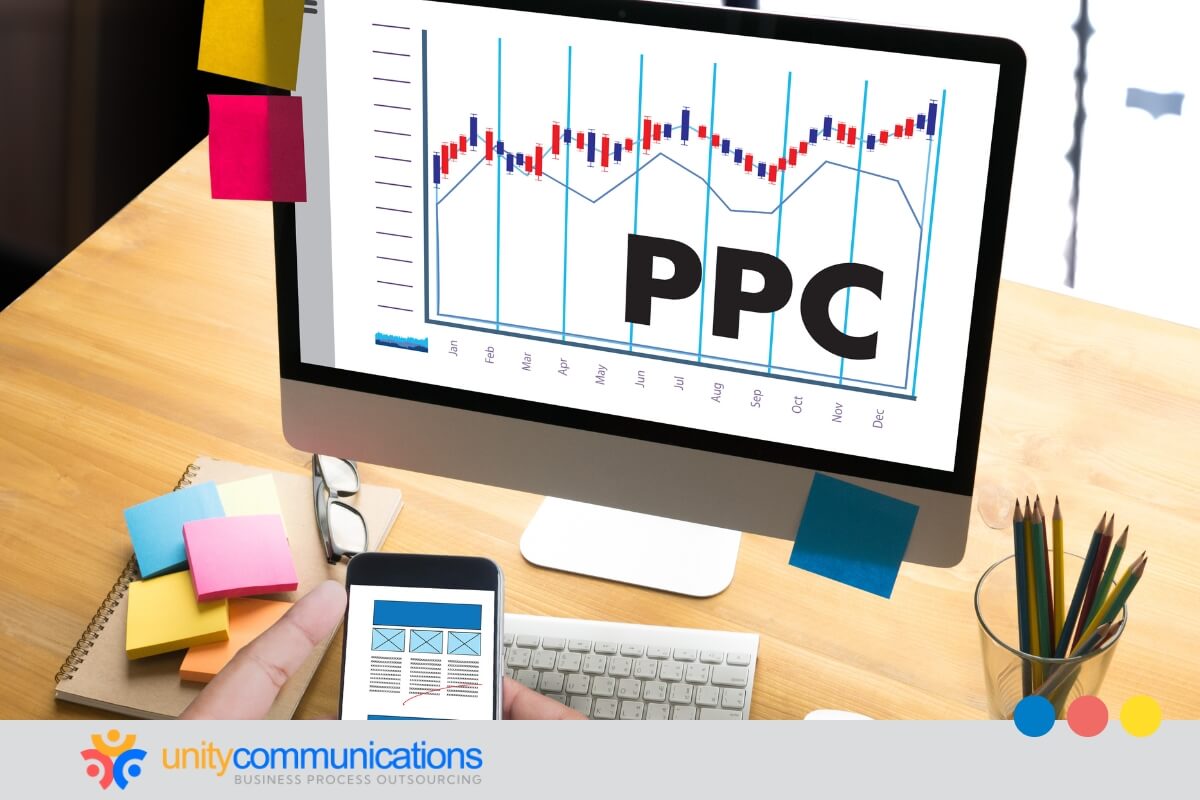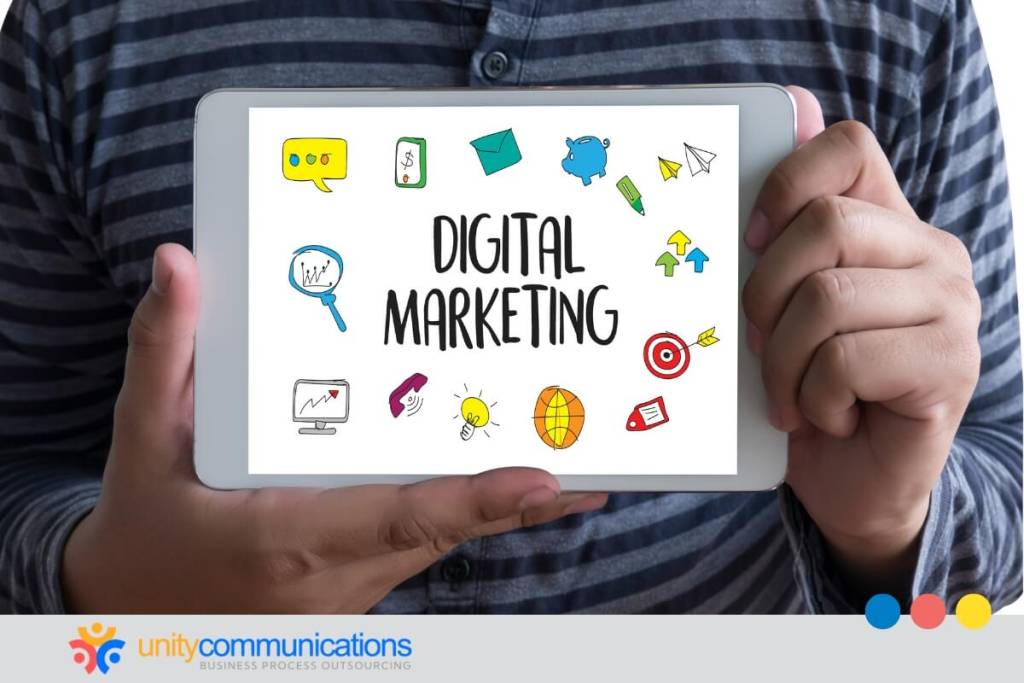IN THIS ARTICLE
Table of Contents
A strong online presence makes businesses more visible to potential customers. When people search for products or services, an optimized website and active social media profiles can significantly increase the chances of being found. This can be achieved through full-service digital marketing.
This practice encompasses all relevant strategies to elevate and maximize online presence, from search engine optimization (SEO) services to pay-per-click (PPC) advertising. Third-party agencies offering end-to-end solutions help businesses harness their potential to the fullest.
Keep reading to learn about full-service digital marketing, including its importance in a digital-first landscape and its components. This article also explores the role of business process outsourcing (BPO) in leveraging digital marketing services for enhanced visibility and sustained competitiveness.
Understanding full-service digital marketing and the role of BPO

Full-service digital marketing is a comprehensive approach to online promotion that integrates various strategies and tools. It tailors essential services to meet specific audience needs and business goals. Examples include SEO, social media marketing, content creation, email campaigns, and paid advertising.
A holistic strategy ensures businesses can attract, engage, and convert their target customers by delivering consistent, high-quality messaging across multiple digital channels. By addressing every aspect of the marketing funnel, full-service digital marketing maximizes brand visibility, customer engagement, and return on investment (ROI).
Partnering with an experienced BPO firm is the optimal choice for executing these services effectively.
Benefits of partnering with a full-service digital marketing agency
What is BPO for full-service digital marketing? It is the practice of contracting a third-party firm specializing in end-to-end marketing functions. How outsourcing works is the BPO organization provides comprehensive support for SEO, PPC advertising, content creation, social media management, and more for efficient and effective operations.
Outsourcing in digital marketing offers the following benefits:
- Expertise and specialization. A full-service agency employs digital marketing experts and stays updated on industry trends and best practices to maintain innovative campaigns.
- Strategic planning and execution. It tailors the digital marketing strategy and handles all aspects of a campaign, from planning to execution and analysis.
- Cost-effective solution. Agencies often have negotiated rates with vendors and tools, leading to cost savings. They also offer services at a fraction of the cost of in-house operations. Outsourcing provides up to 70% savings in labor costs alone.
- Data-driven insights. Digital marketing partners use analytics tools to monitor campaign performance and provide actionable insights.
- Enhanced focus. Businesses reinvest time and effort into core business activities by delegating digital marketing tasks.
- Scalability and flexibility. A full-service team can quickly adjust marketing strategies to accommodate changes in the market or business goals.
By partnering with a full-service digital marketing agency, brands can gain a competitive edge, attract customers, and achieve long-term success.
Key components of a full-service digital marketing strategy

Full-service digital marketing provides a holistic approach to boosting online presence and reach. A comprehensive strategy includes the following components:
Enhancing online visibility with SEO
SEO is a cornerstone of effective digital marketing. It improves visibility in organic search by increasing the likelihood of the website appearing higher in search engine results pages (SERPs) when users search for relevant keywords.
A higher search position boosts a website’s visibility and organic traffic and establishes the brand as a trusted industry authority.
Thirty-nine percent of marketers prioritize optimizing on-page content with targeted keywords as their top SEO strategy. It helps attract high-quality traffic and drives conversion. By promoting SEO using relevant keywords, brands can connect with users who are actively searching for their products or services.
Unlike paid advertising, which requires ongoing investment, SEO delivers lasting benefits.
Full-service digital marketing firms use these crucial SEO strategies for sustained success:
- Keyword research: identifying relevant keywords that the target audience is searching for
- On-page SEO: optimizing website content, including titles, meta descriptions, headers, and images
- Off-page SEO: building high-quality backlinks to the website from other reputable sites
- Technical SEO: ensuring the website is technically sound and easy for search engines to crawl and index
- Local SEO: optimizing the website for local search results, such as Google Maps
Driving targeted traffic using PPC
Pay-per-click (PPC) advertising charges advertisers a fee for each click. Advertisers spend money only when potential customers actively engage with their ad, leading to more targeted and measurable results.
SEO results take time. PPC campaigns can deliver immediate traffic and leads, offering a fast-track solution for reaching potential customers. Businesses can also target specific demographics, interests, and behavior so ads reach the right people.
PPC campaigns provide detailed analytics by tracking key metrics such as clicks, impressions, and conversions. Advertisers can quickly adjust PPC campaigns’ budget, bidding strategy, and ad copy to optimize performance and brand visibility.
Here are the most effective PPC strategies that full-service digital marketing firms apply:
- Keyword research: identifying relevant keywords that the target audience is searching for
- Ad creation: writing compelling ad copy that entices users to click
- Landing page optimization: creating high-quality landing pages relevant to the ads and encouraging conversions
- Bid management: setting competitive bids to help ads appear in top positions
- A/B testing: experimenting with different ad variations to optimize performance
Creating valuable and engaging content through content marketing
Content marketing focuses on creating and distributing quality copy to acquire and retain customers and generate profits. It involves producing blog posts, articles, videos, and infographics to educate and engage the target audience.
Content marketing increases organic traffic through keyword optimization and enhances brand awareness through consistent publication. It also strengthens the brand reputation by providing valuable information and addressing the audience’s problems. Lastly, it attracts potential customers and nurtures them through the sales funnel.
The following are effective content marketing strategies:
- Understanding the ideal customer’s needs, interests, and pain points
- Planning content strategy, including topics, formats, and publication dates
- Producing valuable, informative, and engaging content that resonates with the audience
- Using relevant keywords, meta descriptions, and header tags to improve search engine visibility
- Sharing content on social media
- Tracking website traffic, engagement, and conversions to evaluate content performance
Building brand presence and engagement with social media
In a 2024 survey, 83% of marketers identified increased exposure as a top benefit of social media marketing, with 73% noting higher traffic and 65% citing lead generation. Businesses can consistently share engaging content to enhance brand awareness, broaden reach, and boost visibility.
Social media marketing also improves brand reputation by creating a direct channel for customer interaction, fostering trust, and effectively addressing concerns. Brands can also nurture relationships with their audience by responding to comments, messages, and reviews.
Additionally, many social media platforms offer free or low-cost advertising options, making it a budget-friendly way to reach a large audience.
Part of a full-service digital marketing strategy are the following social media marketing tactics:
- Outlining objectives, whether increasing brand awareness, generating leads, or boosting sales
- Selecting the social media platforms that align with the target audience and brand identity
- Planning content strategy, including the types of content, the frequency of posting, and platforms
- Sharing a mix of text, images, and videos that resonate with the audience
- Responding to comments, messages, and reviews promptly and professionally
- Considering paid social media advertising to reach a wider audience and target specific demographics
- Monitoring key metrics such as engagement, reach, and conversions to measure the effectiveness of social media efforts
Nurturing leads and retaining customers with email marketing
Email marketing is a powerful tool for building customer relationships, nurturing leads, and driving sales. It involves sending targeted emails to a list of subscribers, allowing businesses to communicate directly with the audience without intermediaries such as social media.
Email marketing is a low-cost way to reach a large audience. Even better, it consistently delivers a high return on investment (ROI) compared to other marketing channels.
The following are effective email marketing strategies:
- Collecting email addresses through website forms, social media, and other channels.
- Breaking down lists into smaller segments based on demographics, interests, or behavior
- Developing compelling email content, including newsletters, product updates, and promotional offers
- Personalizing subject lines, greetings, and content to increase engagement
- Experimenting with different subject lines, send times, and content to improve email performance
- Using automation tools to send timely emails, such as welcome emails, abandoned cart reminders, and birthday greetings
- Monitoring key metrics such as open rates, click-through rates (CTR), and conversion rates to measure campaign success.
Crafting user-friendly experiences with expert web design and development
A well-designed website is crucial for successful digital marketing. Its intuitive navigation, user-friendly interface, and fast loading times improve the user experience. Satisfied users are likely to spend more time on the site, engage with the content, and take action.
Search engines such as Google prioritize well-structured, mobile-friendly, and navigable websites. Optimizing a site’s technical aspects improves search engine rankings and attracts more organic traffic.
Further, a website often gives visitors the first impression of the brand. A visually appealing and consistent design can help establish brand identity and create a memorable experience.
Outsourcing digital marketing management, specifically web design and development, usually includes implementing the following best practices:
- Avoiding clutter and focusing on essential information
- Optimizing images, minimizing HTTP requests, and leveraging browser caching
- Designing for mobile devices first and then adapting for larger screens
- Guiding users toward desired actions with prominent calls-to-action (CTAs)
- Implementing SSL certificates to protect user data
- Keeping the website up-to-date with the latest security patches and software updates
The bottom line

Full-service digital marketing encompasses many strategies. These include SEO for improved organic search visibility and PPC campaigns for targeted paid traffic. Other services are content marketing, social media management, and email campaigns.
It provides businesses with an integrated approach to online growth, leveraging data-driven insights to maximize ROI. Partnering with a full-service agency ensures a brand reaches the right audience across multiple channels.
Ready to elevate your online presence with digital marketing? Let’s connect.





